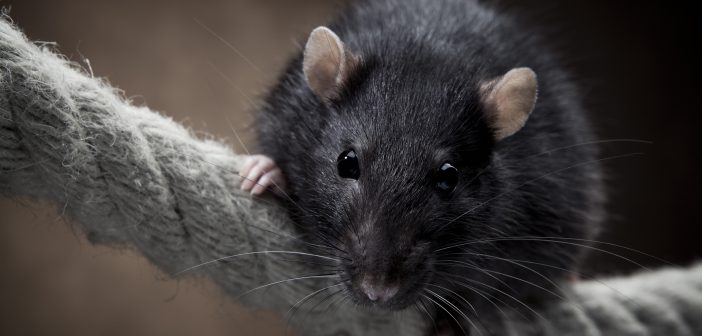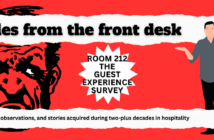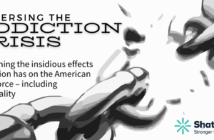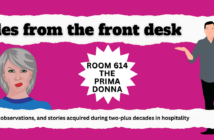How to help avoid the most common winter pest.
by CHELLE HARTZER, BCE
Rodents are one of the most common winter pests. Known to cause structural damage and contaminate food, it’s no surprise that rodent control is a $337 million industry. Unfortunately for the hospitality industry, everything you do to make your hotel cozy and comfortable to attract guests, from delicious food to warm shelter, also attracts rats and mice.
Hotels are susceptible to rodent appearances and infestations during colder months because rodents seek warmth, food and water when temperatures drop – making it a rat race to hotels like yours. And while these adaptable pests may be small, their impact on your business could be large in an era when there’s competition for every guest, and online reviews can capture everything.
Hotel executives and in-house teams can save a lot of time, money and headaches by understanding how rodents work and preventing problems before they happen. By familiarizing yourself with rodent species, common warning signs and ways to keep rodents out before they can check in, you and your staff can help fight against these stealthy pests.
Rodent Species
While there are over 1,800 rodent species, there are five common species that threaten the hospitality sector. When it comes to protecting your business, be on the lookout for one of these five pests.
House mouse: Ranging in size from five- to eight-inches long, these rodents can produce 60 offspring in a single year. While they most commonly live outside, foraging in fields and wooded areas, cold temperatures encourage mice to seek food and warmth indoors.
Norway rat: These large rodents are ground-dwellers that dig subterranean burrows, so they are capable of damaging building foundations and parking lots.
Roof rat: These rodents most commonly live in the southern U.S. and coastal cities, including Seattle, San Francisco and Miami. While they live in the dense cover of trees outdoors, they are known to build nests in attics or on top of storage boxes in commercial units.
Deer mouse: Deer mice are the most abundant mammal in North America. In addition to causing building damage, these rodents are also capable of spreading dangerous diseases, like Hantavirus.
Field mouse: As the most prolific breeders of all rodent species, spotting a single field mouse oftentimes is an indicator of a much larger infestation. They typically affect commercial businesses in rural areas.
Rodent Warning Signs
While rodents may be stealthy, they deposit clues that can alert your staff to their presence. Here are a few signs that rodents might have checked in to your hotel.
Droppings: One of the biggest tell-tale signs, rodent droppings are often found in areas where the rodent population is high. Rats and mice can produce as many as 50 pellets a day, so keep that in mind as you search.
Gnaw marks: Because their incisors never stop growing, rodents continuously chew to wear down their teeth. Some of their favorite objects to nibble on include electrical wires, wooden structures, cardboard and plastic. Keep an eye out for teeth marks around your property.
Grease marks: Rodents can leave greasy stains along walls, floorboards and objects as they scurry. They are habitual creatures, so they often repeatedly use the same paths. This repetitive rubbing can alert your staff that the area is a rodent highway.
Burrows: Check along walls, foundations and beneath slabs and shrubbery for rat burrows. Stuff the burrow with paper and leave it for a few days to determine whether the burrow is active or not.
Rodent Prevention Tips
When it comes to rodent prevention, the best offense is a good defense. The most successful way to eliminate rodents in your property is to keep them out in the first place through exclusion techniques and elimination of attractants. Here’s a simple list of ways you can help prevent rodents.
Eliminate entry points. Did you know rats can fit through holes the size of a quarter? In fact, mice can squeeze through holes as small as a dime. Seal cracks and openings in walls, foundations and around doors and windows in order to help keep rodents out. Double check your door seals, make sure you can’t see daylight around a closed door.
Avoid clutter. Cluttered areas provide a nice home for visiting rodents. Keep closets and storage areas organized to help prevent nesting. Keep your exterior clean as well, and cut back vegetation to help prevent a rodent habitat near your building.
Take out the trash. Ensure your staff is removing garbage regularly, keeping a tidy dumpster area and placing tight-fitting lids on trash cans.
Clean up dropped food. Crumbs and spills make healthy meals for rodents in your hotel. Be sure to store food properly in sealed containers and clean up messes promptly.
Protecting your property from rodents is crucial to maintaining an excellent reputation with current and future guests. Schedule a meeting with your pest management professional to ensure you and your staff are maximizing your rodent defense strategy. He or she can inspect for entry points, suggest rodent-proofing equipment and train your staff on identification and warning signs. With a strong partnership between you and your pest management professional in place, you can help gnaw away at rodent problems before they begin. ■
Chelle Hartzer is technical services manager for Orkin. She is a board-certified entomologist and provides technical support and guidance across all Rollins brands in the areas of operations, marketing and training. For more information, email [email protected] or visit www.orkincommercial.com.
Photo courtesy of Orkin




